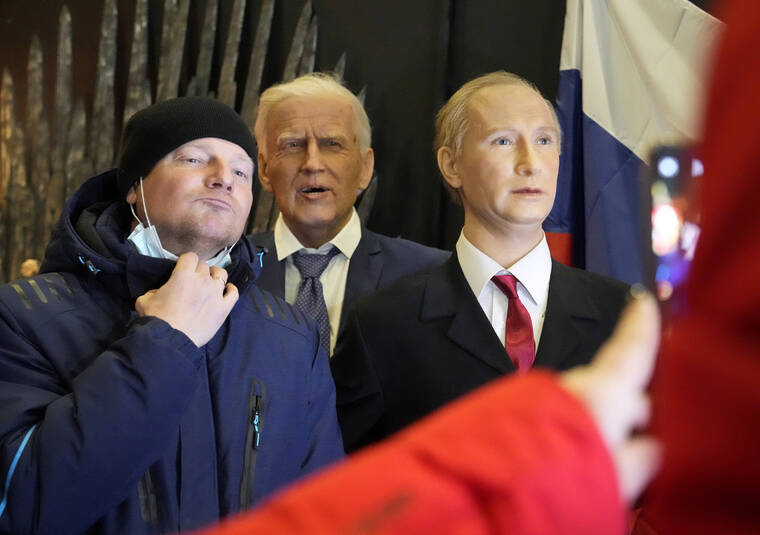WASHINGTON — Russia’s military buildup on the border with Ukraine will be the top focus of talks between President Joe Biden and Russia’s Vladimir Putin on Tuesday, but there are plenty of other thorny issues on the table as well, including cyberattacks, human rights, and US-Russian relations that a Kremlin spokesman says are overall in “a rather dire state.”
Fyodor Lukyanov, a leading Moscow-based foreign policy expert, suggested that progress on nuclear arms control and cybersecurity since the summit in Geneva will be discussed, and that regional topics like Syria, Afghanistan and North Korea might get a cursory mention, but mostly it will be about tensions over Ukraine.
“All conversations these days are held in a Cold War fashion —- the Cold War fashion meaning that we don’t solve problems together, the only thing we do is defusing tensions where they grow. Ukraine and eastern Europe — there is this effect of rising tensions, or at least it is perceived. In all other places, Russia-U.S. tensions aren’t growing, so there’s nothing to talk about,” Lukyanov told the AP in an interview on Monday.
Both the White House and the Kremlin have tried to lower expectations for the call, with both sides saying they don’t expect any breakthroughs on Ukraine or the other issues up for discussion. But the two powers maintain that the conversation —- the leaders’ first since the summer —- is progress in and of itself.
U.S. officials said the call would not be confined to just the Ukraine issue because other matters “critical” to national security need to be discussed.
A look at what else is on the agenda for Putin and Biden when they speak Tuesday:
IRAN
After the latest round of talks meant to bring Iran back into compliance with the 2015 nuclear deal went nowhere, the international community is facing key decisions in the coming months on what to do about that country’s fast-advancing atomic program. Former President Donald Trump withdrew the U.S. from the agreement, but Biden has made rehabilitating the accord a top priority as Iran enriches uranium closer to the purity level required for a weapon. Russia is still a party to the accord and the two leaders may discuss the next steps in trying to convince Iran to return to compliance with the deal.
SPACE
A Russian anti-satellite missile test last month sent a cloud of debris across low-earth orbit forcing astronauts on the International Space Station to take shelter and NASA to delay a space walk. The test, which the U.S. condemned as “recklessly conducted,” sparked new fears about the militarization of space, and the prospects that such tests could pose hazards to space exploration and development for generations to come. The Biden-Putin discussion will also come weeks after China was revealed to have tested a hypersonic sub-orbital weapon. The White House says Biden will raise the importance of “strategic stability in the nuclear and space domains” on the call.
PRISONERS
Two former U.S. Marines, Paul Whelan and Trevor Reed, are imprisoned in Russia on charges the U.S. government contends are unjust. Both the U.S. and Russian governments have previously expressed openness to discussions about potential prisoner swaps that could result in the Americans’ release, and Biden has pledged to continue to raise their plight with Putin.
DIPLOMATS
The U.S. and Russia are in the midst of a years-long tussle over staffing at diplomatic outposts in one another’s country, but talks have been under way for months to ease tensions. The U.S. shuttered two Russian compounds in 2016 in retaliation for Russian election meddling and also expelled some Russian diplomats on spying charges. Russia retaliated by shuttering U.S. outposts and curtailing America’s’ ability to hire local workers in Moscow to staff its embassy. The row escalated in recent months over visas for U.S. diplomats in Russia, resulting in critical staffing issues. An agreement to ease tensions could be reached as a “deliverable” from the call, officials said
CYBERSECURITY
On Monday, one year since the disclosure of the massive SolarWinds cyberespionage campaign traced to Russia, the security firm Mandiant said hackers associated with Russia’s SVR foreign intelligence agency continued to steal data “relevant to Russian interests” with great effect. In their first in-person meeting in June, Biden pressed Putin to crack down on malicious cyber actors and earlier this year sanctioned some companies and individuals associated with the effort. The Biden administration has tried to develop “rules of the road” for activity in cyberspace, but there has been little progress on the matter since the June summit.
———
Litvinova reported from Moscow.


